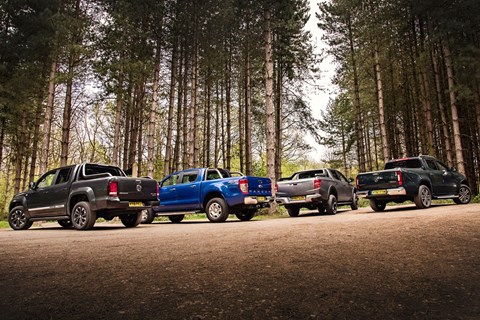► Planned pick-up tax changes scrapped
► Taxman was to view double-cabs as cars
► Reassuring but huge U-turn from HMRC
The UK tax authorities have climbed down on plans to close the loophole that allows pick-up trucks with a payload of greater than one tonne to be taxed as a van, not a car. The move, was announced quietly yesterday by HMRC on 12 February, but just one week later it has equally quietly confirmed that it has reversed its plans.
The idea was to treat pick-up trucks as cars and therefore calculate their company-car tax on their CO2 emissions, which could have sent costs soaring by more than five times. This would surely have had a drastic impact on the popular pick-up truck market and resulted in lower sales, as well as leaving thousands of small businesses and sole traders massively out of pocket.
For around two decades, private individuals have been able to run pick-ups as company cars and pay significantly less benefit-in-kind than if they were a regular saloon, hatchback or SUV.
However, in note EIM23151 released on 12 February 2024, HMRC signalled its intention to rescind the tax break on all new pick-ups ‘purchased, leased or ordered’ from 1 July 2024.
Huge U-turn comes just a week after tax changes announced
Just a week later, on 19 February, HMRC issued a statement saying: ‘The government has listened carefully to views from farmers and the motoring industry on the potential impacts of the change in tax-treatment. The government has acknowledged that the 2020 court decision and resultant guidance update could have an impact on businesses and individuals in a way that is not consistent with the government’s wider aims to support businesses, including vital motoring and farming industries.’
This is reassuring, but raises the question of why such a huge announcement was made with so little consultation done in advance. The statement went on to confirm that everything will be remaining exactly as it was, so nothing has changed at all despite the planned huge revamping of the tax system.
Double-cab pick-up tax changes: why the benefit was disappearing
Pick-ups have been classified in the grey area between passenger cars and vans for some time. Popular with farmers, self-employed traders and rural types, they have proved a hardy workhorse and the UK taxman has historically judged that trucks with a payload in excess of one tonne are closer to commercial vehicles than private cars.

The automotive industry responded with a raft of ever-plusher pick-ups, especially the double-cab variants with an extended cabin allowing two rows of seats. HMRC argued that these were now used more often as private cars than working trucks – and decided to close the tax loophole for company car drivers.
This completely ignored the many motorists that have legitimate business need for a pick-up truck that can carry several workers and a load of equipment into areas that a van can’t reach. HMRC was punishing those many users in order to clamp down on a few that had taken advantage of the loophole.
It said: ‘From 1 July 2024, HMRC will no longer interpret the legislation that defines car and van for tax purposes in line with the definitions used for VAT purposes,’ the paper says. ‘This VAT approach for double-cab pick-ups differentiated based on payload, with anything under one tonne classified as a car, and anything a tonne and over as a van. This rule was replicated as a pragmatic way of resolving the primary suitability and classification of double cab pick-ups.’

The point of law at play is a hearing at the Court of Appeal in Payne & Ors (Coca-Cola) v R & C Commrs (2020). The court found that the use of crew vans meant that supposed commercial vehicles were in fact suitable as private cars too, providing a benefit-in-kind to company car drivers who could use them for family and leisure purposes as much as work. ‘As a consequence [crew vans and their ilk] failed to qualify as goods vehicles and were classified as “cars” for benefit-in-kind purposes,’ the HMRC noted.
What impact would the tax change have had?
CAR magazine predicted that the UK’s pick-up market would have undergone significant change in the years ahead had the tax hike come in. There was a planned grace period – all trucks bought or ordered before the 1 July switchover would have been classified under the existing system.
As a result, it was likely that sales of double-cab pick-ups would have blossomed in the run-up to this date before falling back, potentially dramatically, as the tax advantages of running a double-cab as a company car disappeared.
Of course, the advent of all-electric pick-up trucks – including the likes of the Ford F-150 Lightning and Rivian R1T, not yet officially sold in the UK – will reshape the argument naturally, as company EVs qualify for even lower benefit-in-kind charges than commercial vehicles.
Electric pick-ups heading to the UK soon
One solitary electric pick-up truck is sold in the UK today: the Maxus T90EV. Others are in the pipeline, including the Fisker Alaska and a plug-in hybrid Ford Ranger is coming in 2025. Any electrified truck is a good bet to help reduce running costs and potentially benefit-in-kind bills.
Government policy looked like it was going to massively reshape an entire sector of the automotive industry, as well as many others that rely on the vehicles affected. Instead, the opposite turned out to be true as industry fought back and shaped government policy.
Our guide to the best pick-up trucks